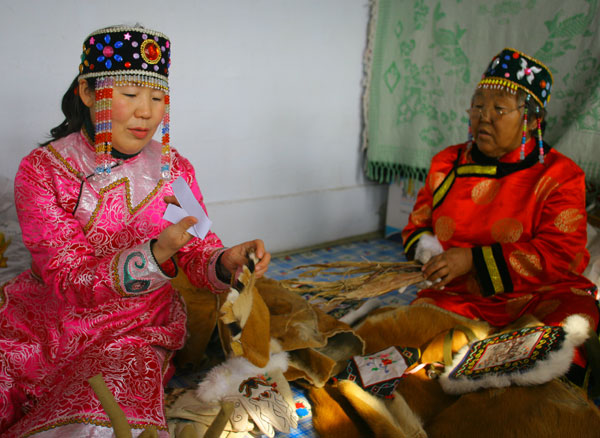Hunters try to capture their past
Updated: 2011-12-30 09:02
By Li Yao (China Daily)
|
||||||||
Villager Mo Caiqiang, 33, longs for the annual hunting season in Xinsheng township, Heihe. With 12 years' experience, he has learned skills from older generations and talks with great authority about tracking animals.
The best time to hunt is during the first snowfall, he said, but authorities issue permits and shotguns late. Hunters can take only what the poachers leave.
"Game was abundant years ago," he said. "Deer and boars roamed the forests. Now there is little to be found, because of poaching and deforestation. People will blame the Oroqens for overhunting one day when there is no more game running in the forests.
"I hope a nature conservation area will be built here and managed by Oroqen people. We are natural protectors of the forests and can keep poachers away while bringing our traditions back to life."
'I feel proud'
The first school-age Oroqen generation, which included Mo Guizhen, received an education amid a majority of Han Chinese. The Oroqen tongue quickly lost appeal, even in family surroundings.
Mo's mother had difficulty speaking Mandarin and usually took Mo grocery shopping. "I dreaded the task at that time, for fear of being laughed at by my classmates when I talked with my mother in the Oroqen language," Mo said.
Decades later, she feels compelled to learn the ethnic language. She petitioned to Heihe's mayor for the establishment of a singing and dancing troupe in Xinsheng township and has led a performance team since 2008.
The troupe gives tourists a snapshot of the Oroqen people's dying culture, offers greetings with homemade koumiss (fermented horse milk) and presents unique clothes, collections of household utensils made of birch bark, singing and storytelling in Oroqen and sometimes Mandarin.
Wu Nan, 22, said that joining the team helped her embrace her roots. "At school the stereotypes always offended me when my classmates said Oroqens were fierce and malicious savages."
Wu had felt little connection to Oroqens beyond her brother's stories from hunting trips. Today's hunters use trucks, not horses, to transport food and other supplies during a one-week or longer stay in the forests.
The troupe's performance schedules require members to pick up the ancestral language. Wu uses her English-learning techniques, writing Mandarin characters to remind herself of the pronunciation and meaning of Oroqen words. Now she can sing dozens of folk songs and has a growing vocabulary.
"I feel integrated . . . and proud of being Oroqen. We are a people good at dancing, singing, hunting and shooting. The downside is that we are too honest and often cheated," Wu said.
For lack of funds, the troupe has no stable full-time members, especially male performers. Sometimes Wu's boyfriend, who works at the township clinic, and Mo's son help out.
|
 |
|
Wu Xueying (left), village head of the new Oroqen town, learns to make a fur coat from Ge Changyun, an Oroqen cultural heritage bearer. [Photos by Teng Jun / for China Daily] |
Guan Jinfang, 55, leads a singing and dance troupe that was set up in 2005 in Huma county, Heihe. She was named the national heritage bearer for Oroqen folk songs in 2009 and has collected more than 500 folk songs in three decades.
"Our culture is going toward extinction, unless extraordinary measures are taken to keep it alive. As old people are dying, soon children will only be able to find past traditions in books, museums and video programs," Guan said with a sharp urgency.
Guan went on to enumerate the fine character of Oroqen people: They were survivors, living by wits in harsh conditions. Respecters of nature, hunters looked only for enough to sustain the family. Their prey was divided equally, including the aged, the sick and the disabled.
Guan's troupe recreates the scenes of a hunting life. "We are also singing new songs that give modern contexts to traditional tunes," Guan said, explaining her vision to attract a wider audience.
Members of her troupe are village volunteers. Guan said they portray Morikun, the heroic hunters whose battles with devils and beasts were praised in folk songs.
To improve their performing standards, Guan hopes to arrange training by music professors at Harbin Normal University in Heilongjiang's provincial capital, Harbin.
Guan counted her strengths: fluent in the ethnic tongue and a gifted storyteller and singer. "I keep challenging myself - have I tried my best? - and will continue the efforts until my last breath."
Her husband died 10 years ago, and she lives with her children and grandchildren. At home the family communicates in Mandarin.
As marriages with Han Chinese are on the rise, younger generations grow up in a Mandarin-speaking environment. The Oroqen language is as foreign to them as English. In the process, they lose access to folklore such as songs, art and literature.
No modern relevance
Meng Shuzhen, 61, has also devoted more than three decades to collecting folk songs, but sometimes feels she is striving for a lost cause with no real folklore revival.
"The best scenario is that there will be a place for Oroqen heritage in museums and performances to represent part of China's diverse culture. But in reality, the role of Oroqen traditions is minimal," Meng said.
For example, birchbark housewares from infants' cradles to boats and traditional garments made of animal fur and skin may be put on display but will never regain their relevance to daily life.
"Oroqens have a weak culture that is being assimilated," she said. "Today Oroqen people are little different from Han Chinese. They want the same things from a comfortable life and fall victim to the same social ills, such as disrespect to parents and selfishness."
Before the 1950s, Meng said, "selfish" was not part of the Oroqen vocabulary.
Write to the reporter at liyao@chinadaily.com.cn.











